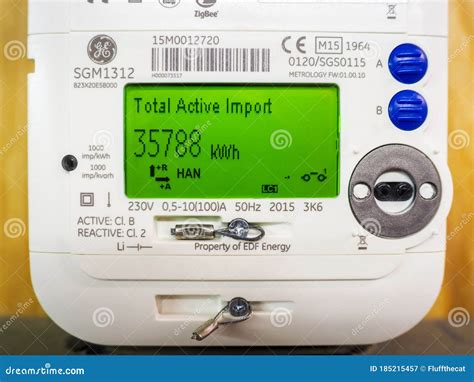Metering energy consumption is a crucial aspect of managing and reducing energy usage in various settings, including residential, commercial, and industrial environments. The ability to accurately measure energy consumption enables individuals and organizations to identify areas of inefficiency, optimize their energy usage, and make informed decisions about energy management. In this article, we will explore five ways to meter energy, each with its unique characteristics, advantages, and applications.
Key Points
- Smart meters provide real-time energy consumption data and remote monitoring capabilities.
- Submeters offer a cost-effective solution for monitoring energy usage in specific areas or equipment.
- Energy loggers are portable devices used for temporary energy monitoring and data collection.
- Power quality analyzers measure and analyze various parameters of electrical power to identify potential issues.
- Intelligent metering systems integrate advanced technologies, such as IoT and AI, for enhanced energy management and automation.
Smart Meters

Smart meters are advanced energy metering devices that provide real-time data on energy consumption, voltage, and power quality. These meters use wireless communication technologies, such as cellular or mesh networks, to transmit data to utilities, energy management systems, or cloud-based platforms. Smart meters enable remote monitoring, automated meter reading, and timely detection of energy theft or tampering. They also facilitate the implementation of time-of-use pricing, demand response programs, and other energy management strategies. For instance, a study by the National Renewable Energy Laboratory found that smart meters can help reduce energy consumption by up to 12% through real-time feedback and behavioral changes.
Submeters
Submeters are specialized energy metering devices used to monitor energy usage in specific areas, such as individual rooms, equipment, or circuits. These meters provide detailed information on energy consumption patterns, helping facility managers and building owners identify opportunities for energy savings. Submeters are often used in commercial and industrial settings, where energy usage can be high and varied. They are also useful for monitoring energy-hungry equipment, such as data centers, HVAC systems, or manufacturing machinery. According to the U.S. Department of Energy, submetering can help reduce energy waste by up to 20% through targeted energy efficiency measures.
| Energy Metering Technology | Accuracy | Cost |
|---|---|---|
| Smart Meters | ±1% | $50-$200 |
| Submeters | ±2% | $20-$100 |
| Energy Loggers | ±3% | $100-$500 |
| Power Quality Analyzers | ±1% | $500-$2,000 |
| Intelligent Metering Systems | ±0.5% | $1,000-$5,000 |

Energy Loggers

Energy loggers are portable devices used for temporary energy monitoring and data collection. These devices are often used to monitor energy usage in specific equipment, such as motors, pumps, or lighting systems. Energy loggers provide detailed information on energy consumption patterns, helping facility managers and maintenance personnel identify opportunities for energy savings. They are also useful for troubleshooting energy-related issues, such as voltage drops or power quality problems. For example, a study by the University of California found that energy loggers can help reduce energy consumption by up to 15% through targeted maintenance and repair.
Power Quality Analyzers
Power quality analyzers are specialized devices used to measure and analyze various parameters of electrical power, such as voltage, current, frequency, and harmonics. These devices provide detailed information on power quality issues, helping facility managers and electrical engineers identify potential problems, such as voltage sags, swells, or harmonic distortion. Power quality analyzers are often used in industrial and commercial settings, where power quality issues can have significant impacts on equipment operation and reliability. According to the Institute of Electrical and Electronics Engineers (IEEE), power quality analyzers can help reduce equipment downtime by up to 30% through proactive maintenance and repair.
Intelligent Metering Systems
Intelligent metering systems integrate advanced technologies, such as IoT, AI, and machine learning, to provide real-time energy monitoring, automated meter reading, and predictive analytics. These systems enable utilities, facility managers, and energy managers to optimize energy distribution, predict energy demand, and detect potential energy-related issues. Intelligent metering systems also facilitate the integration of renewable energy sources, energy storage systems, and electric vehicle charging infrastructure. For instance, a study by the National Institute of Standards and Technology found that intelligent metering systems can help reduce energy consumption by up to 20% through advanced energy management and automation.
What is the primary benefit of using smart meters?
+The primary benefit of using smart meters is the ability to provide real-time energy consumption data, enabling utilities and energy managers to optimize energy distribution and reduce energy waste.
How do submeters help reduce energy consumption?
+Submeters help reduce energy consumption by providing detailed information on energy usage patterns, enabling facility managers to identify opportunities for energy savings and implement targeted energy efficiency measures.
What is the primary application of energy loggers?
+The primary application of energy loggers is temporary energy monitoring and data collection, often used to monitor energy usage in specific equipment or systems.
How do power quality analyzers help reduce equipment downtime?
+Power quality analyzers help reduce equipment downtime by providing detailed information on power quality issues, enabling facility managers and electrical engineers to identify potential problems and implement proactive maintenance and repair.
What is the primary benefit of using intelligent metering systems?
+The primary benefit of using intelligent metering systems is the ability to provide real-time energy monitoring, automated meter reading, and predictive analytics, enabling utilities and energy managers to optimize energy distribution and reduce energy waste.
Meta description suggestion: “Discover the 5 ways to meter energy, including smart meters, submeters, energy loggers, power quality analyzers, and intelligent metering systems, and learn how to reduce energy consumption and optimize energy management.” (149 characters)


